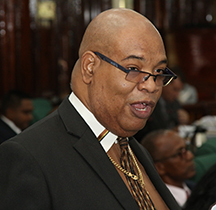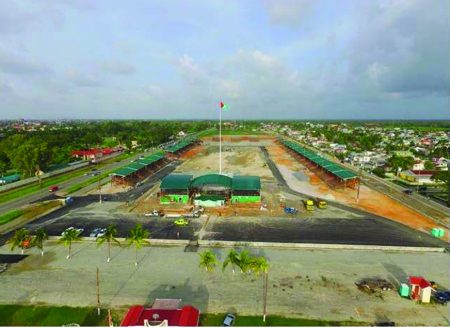PPP/C parliamentarian Juan Edghill has written the Chairman of the Public Procurement Commission (PPC) Carol Corbin to request an investigation into the award of contracts and the use of public funds for the D’Urban Park Development Project.
Edghill’s letter followed another last week to the PPC seeking an investigation into the controversial Charles-town bond contract to Larry Singh, and another by fellow PPP/C parliamentarian Gail Teixeira requesting an investigation of the award of the contract for the consultancy for the feasibility study and design for the new Demerara River crossing.
The more than one billion dollars spent on the D’Urban Park project has not only raised concerns about the expenditure but the circumstances under which goods and services were supplied to the project, which was one of the earliest undertaken by the APNU+AFC administration. It appeared to have proceeded without any tendering and the shoddy construction work that was uncovered at the venue put the project under intense scrutiny. Public monies had to be spent to repair the poor work.

Very little paperwork has been presented by the government on the project and sums are said to be still outstanding to some suppliers.
In his letter to Corbin, which was dispatched last Tuesday, Edghill noted that the project was announced to be a privately financed undertaking, with the development commencing in Septem-ber, 2015, in preparation for the hosting of the 50th Independence Anniversary celebrations. “The National Assembly was informed that this project would be funded by private individuals through an unnamed private organization, and, that this project would be no drain on the public purse,” he said, while noting that there were no specified budgetary provisions in the 2015 and 2016 national budgets for the project.
However, he said in April, 2016, President David Granger mandated the Minister of Public Infrastructure to immediately assume full responsibility for the project and in November, 2016, a total of $406.7 million in public funds was sought and approved by government from the Contingency Fund to pay contractors and suppliers of goods and services for work done at the project.
In December, 2016, he added, a further $500 million was sought and approved for the project from the Contingency Fund.
“We were told in the Committee of Supply of the National Assembly that the sums approved would be given to the Homestretch Develop-ment Inc. (HDI), a special purpose company, to honour its financial obligations to contractors and suppliers,” he said, while noting that it was on that occasion that the name of the company was made public.

HDI was registered on January 22, 2016.
Edghill noted that from September, 2015 to January, 2016, there was no account of the money collected, who collected it, who authorised the collection, or how it was spent. He said while government had promised to account for the donations received, this was not done.
He added that from April 22, 2016 to June, 2017, it is estimated that public funds amounting to $1.5 Billion have been spent on the project.
As a result, he requested that the PPC investigate the procurement process for contracts awarded to facilitate works on the project prior to April 22, 2016 and up to June 30, 2017. He said he also expected that the PPC would look at what payments were made to individuals, contractors and companies as it relates for the project and what liabilities, if any, to individuals, contractors and companies were owed for works and services up to June, 2017. In addition, he said he anticipated that it would investigate if there was a budgeted and actual cost for every completed phase of the project and a projected final cost for the overall project.
Edghill is also seeking to have the PPC pronounce on if a private company can engage contractors without any procurement process and then request and receive public monies for funding the contracts as well as whether the Procurement Act binds government-owned and controlled Special Purpose Companies to follow its procurement rules. He also asked the PPC to look at whether there was any illegality or mismanagement of this project and, if so, to address the recommended remedial actions.
The government was criticised for failing to disclose the establishment of the company of the involvement of Dr Rupert Roopnaraine, then Education Minister, who served as a director for the company representing the government.
President David Granger had said that HDI was a special purpose company that was set up to manage the preparation of the facility for the independence jubilee celebrations in the absence of a budgetary allocation. “….So there is nothing secret, or there is nothing criminal about the HDI, it did serve a purpose and when that purpose or that usefulness came to an end, responsibility was handed over to the Ministry of Public Infrastructure,” he had said during a segment on The Public Interest interview programme.
The president added that the “transitional company” company only existed for six months and enabled the administration to complete the project.
The full names on the Articles of Incorporation for HDI are Lawrence (Larry) Wilson, Bobita Ram, Victor Wilson and Gentian Miller.




